- Home
- Melody Carlson
Notes from a Spinning Planet—Papua New Guinea Page 6
Notes from a Spinning Planet—Papua New Guinea Read online
Page 6
For a split second I can relate to Peter. I so dont want to touch this woman. To be honest, I dont even want to be here right now. To make matters worse, I'm starting to feel a wave of nausea coming on. This is not good. So I tell myself just to chill, remembering how its probably the Malarone pill I took with breakfast. Still, it does make me wonder how bad malaria can be if taking these pills makes me feel this lousy. I look at the woman and realize that she probably feels way worse than I do.
I take a steadying breath and scoot a chair next to this woman's bed and ask if I can sit down. Peter translates this into pidgin, and the woman looks slightly surprised, but she nods her head with a tired sigh. Then I introduce myself to her and tell her I'm from the United States, and she tells us that her name is Mary Kilamo and that she is from a village near the town of Goroka.
“I'm working on a news article about the AIDS epidemic in Papua New Guinea,” I begin slowly, waiting for Peter to translate this as I take out my notebook and write down her name.
She gives me a blank look, almost as if she is bored or maybe just tired, and I ask Peter if she understands what he just told her.
He nods.
“And I want to get stories of real people,” I continue, “people like you who have AIDS. Do you mind if I ask you some questions?”
Peter translates this, and the woman from the bed on the other side of Mary makes a comment, which I can't understand. I glance at Peter, who looks slightly exasperated. “It was nothing,” he says. “Nothing you want to hear.”
“Did she say something bad?” I ask.
“I think she's jealous,” he tells me. “She wants you to talk to her instead of Mary.”
I turn and force a stiff smile at the plump woman, who doesn't look nearly as sick as Mary. In fact, she looks perfectly fine, and I wonder why she's here taking up valuable space. “Tell her I will talk to her after Mary,” I say, and Peter quickly dispenses this message to her. She nods and smiles smugly at me. )
Then I look back at Mary. “How are you feeling today?”
“No goot” she says without waiting for Peter to translate.
“Do you speak English?” I ask.
“Nogat?”
“Oh.” I smile at her. “But maybe you understand it a little?”
The corners of her mouth almost turn up into a smile but not quite. Then she slowly nods.
“How long have you been in the clinic?” I ask, and Peter translates.
“Three months,” he tells me, and I write it down.
Then I ask if her family comes to visit her, and I discover they do not. So I ask about friends and learn that she has none. I ask how old she is and find out she's twenty-three. Then I ask how long she s had AIDS, and she tells us she got it when she was eleven. I feel shocked at this. She's not much older than I am, but she has had AIDS for twelve years, more than half of her life. I tell her that I'm sorry and that it's too bad. As I say this, I can feel tears in my eyes, and I don't even try to hide them.
“Do you mind if I ask how you got AIDS?”
Peter translates and then waits for what is a fairly long answer. But after she's done speaking, he just sits there for an even longer time. His face is expressionless, and I assume he's trying to reword her response into English for me. But when he begins to tell me her answer, I see that he, too, has tears in his eyes. I can tell this is difficult for him.
“She says it happened in her village when she was a young girl. She and her friend were supposed to be working in the garden, which is away from the village, but they were playing like children do. And they were careless, too near a public road. A band of men found them and took the girls away in a truck. They took them far from home. And then the men raped both the girls. Many times.” He takes in a sharp breath and continues. “Her friend was killed. But Mary did not die. After some time-she does not remember how long-she became sick, and the men let her go.”
Tears are running freely down my cheeks now, and despite my earlier revulsion, I take Mary's hand in mine and tell her that I'm so sorry. She seems to understand this without translation. Peter also says he is sorry, but he remains where he's sitting. He doesn't touch her. That's okay, maybe even for the best. I make some quick notes, planning to fill in more details later.
Then she says something else, and Peter translates for me. “That was a long time ago.” It's as if she's trying to make us feel better.
I nod. “Yes. But what happened after that? After the men let you go, did you return to your home?”
Peter translates, and I learn that, yes, she did return to her home. But she returned in shame. Her family was disgusted with her. They told her to leave, that she was not welcome. She was worthless to them. Dead.
I remember something I recently read about New Guinean culture. Daughters have monetary value because their families can get a bride price when they are married. In other words, the groom must pay the brides father with livestock and produce and other goods in order to marry her. Depending on the girl, the price can go quite high. Seeing that Mary is a very pretty girl, I'm guessing her family had great hopes for her. I'm guessing she was an investment that lost its value.
“Was she considered worthless because a daughter's value is related to the bride price?” I ask Peter in a quiet voice.
Peter sadly nods, thankfully without even translating my words to Mary. I can tell he's familiar with this custom. Perhaps he even had to come up with a bride price for his own wife. But poor Mary. Just because she was raped and hurt, she lost everything. It's so sad. So unfair.
“What did you do after your family sent you away?” I ask. I realize I'm still holding her hand, but she doesn't seem to mind.
She tells us that she stayed with relatives in another village. They made her work for food. But it wasn't long before they, too, did not want her around. And so she came to the city, to Port Moresby.
“And what did you do here?” I ask.
Peter translates, and she pulls her hand away from mine and looks down at her lap. I can tell she's ashamed.
The woman from the next bed laughs and says something to Peter, something that seems to embarrass him. He looks away. Mary looks uncomfortable too. She turns and looks out the window again.
“What did that woman say?” I ask Peter.
He leans over and speaks quietly to me. “She said Mary was a sex worker.” He turns and scowls at the woman. “She used different words, cruel words, but that is what she said.”
“It's not surprising,” I tell him. “She had no family, no friends, no education, and her future was ruined.”
He frowns and looks at the floor. I can tell this isn't easy for him, and I thank him for his patience and his help.
“It's all right,” he says.
“I want to tell her about a woman in the Bible-the one caught in sin, the one Jesus defended.”
His eyes brighten now. “I know that story, Missis Chase. I translate that story for Mister and Missis Johnson. I can tell her that story.”
And so I sit and listen as Peter tells the story. I don't understand the words, but I can almost tell what he's saying by his hand movements and expressions.
“I told her how no one threw a stone,” he says.
“That's great!” I tell him. “Did you say that Jesus forgave her?”
So he goes on to tell her more. I watch Mary as she listens, and somehow I think she understands the significance. And then he stops and looks at me.
“Did you tell her that Jesus wants to forgive her too?”
“I almost forgot.” And then he begins to talk with excitement, telling her that last bit. His eyes light up as he continues. I'm not sure what he's saying, but Mary is listening intently. In fact, it seems the other women are listening rather intently too.
Then Peter turns and looks at me with an almost-radiant expression. “She wants to pray with us. She wants to invite Jesus into her heart. She wants to receive his forgiveness.”
I'm nodding now, and I tak
e Mary's hand. “Yes,” I say to Peter, “let's pray with her. Can you do this?”
“Yes. I am also a pastor for our village church. I know how to pray this prayey. We pray it often in our church.”
And so we bow our heads, and Peter prays, and Mary echoes his words, and finally he says “amen.” And when I look up, Mary is quietly crying. But she is also smiling.
“Tell Mary that she is our sister in Christ now,” I say with excitement. This is so amazing. I mean I've been a Christian for years, but I've never experienced anything quite like this before.
Mary nods after Peter tells her she's our sister. Then she leans back against her pillow and takes in a deep breath. She closes her eyes, and I sense that she's tired. I hope we haven't worn her out. We all sit there quietly for a couple of minutes.
“Maybe we should go,” I say to Peter. “Ask her if she needs to get some rest. But tell her we'd like to come back and talk to her some more.”
So he does this, and she nods and says something.
“She wants us to come back later,” he says. “She is tired.”
Then the woman in the next bed speaks again. And Peter tells me that she is ready to talk now.
“Tell her we'll come back later for her story,” I say, thinking I'd rather not talk to her at all if possible. “Tell her I need to write some things down first so I don't forget.”
He nods and speaks to the woman, who clearly looks disappointed, but I don't really care. I tell Mary good-bye, and we leave. I head straight back outside to the courtyard, feeling the need for some fresh air and sunshine. We go over to the table and chairs and sit down.
“You did a good thing in there,” I tell Peter as I open my notebook.
He nods and smiles. “I know. God was with us, Missis Chase.”
“Are you glad you changed your mind about talking to someone with AIDS?” I ask, even though it seems obvious.
“Thank you for helping me, Missis Chase.”
“Thank youl”
Peter sits there humming as I write some more notes, and when I'm done, I realize it's close to noon. “I need to call my aunt,” I tell him. So I call Sid and tell her what's happening here.
“Do you want to stay longer?” she asks.
“Just a minute,” I say. Then I ask Peter if he has more time to translate for me, and he eagerly agrees. “Yes,” I tell her. “It's going so well, maybe we should just keep at it.”
“I have an idea,” she tells me. “I'll bring you guys, some lunch. How does that sound?”
“Great!”
Then Peter and I gp back and interview a young man named Manoa, whose story is just as sad as Marys. And in some ways it is much worse. He, too, was kidnapped as a child. He was sexually abused and beaten. When police found him, instead of returning him to his family, they locked him up. And there his abuse continued. Unfortunately, Manoa is very bitter about all this. And, really, who can blame him? Even when Peter tries to tell him about Jesus, Manoa doesn't want to hear it. He holds up his hands and tells Peter about how he went to the church for help once, but the Christians turned him away.
“Tell him that not all Christians are like that,” I instruct Peter. “Tell him there are Christians who would accept him and love him the way Jesus does.”
Peter nods sadly, and I can tell that he's feeling bad about some of his own previous prejudices. Perhaps he has been one of those Christians himself, the kind who would turn someone like Manoa or Mary away. But he's changing. It's obvious to see he's changing.
Sid comes with our lunches, and we go outside to eat and visit with her. Peter, with great enthusiasm, tells her all about Mary and how she accepted Jesus into her heart.
“I wonder if Christians ever come to see the patients here?” says Sid as we're finishing our lunches.
“I can ask Lydia,” I offer. “I'm sure she would know.”
“Lydia visits with the patients,” says Peter, almost as if the meaning of this is just hitting him. “She is a good Christian.”
“Maybe people need to get the word out,” I tell Peter. “Christians need to hear about what you experienced today.”
He nods solemnly. “Yes. I will go out and tell them my story. I will tell them how I have changed. I will challenge them to change with me. I will remind them of Jesus and the ten lepers.”
SEVEN
After lunch, my aunt goes over some things with Dr. Larson while Peter and I return to Marys room. She's had a nap and food and seems to be feeling stronger now. We visit with her some jxLore, and Peter promises to send other Christians to talk to her. He even asks if she would like a Bible, but she says she cant read very well. The woman in the bed next to Mary demands our attention. She insists on being heard. So I move my chair over by her bed, and, trying to hide my exasperation, I begin to ask her the same sorts of questions, and Peter patiently translates for me. Her name is Pilada, and I soon discover that her stçry is a bit different from the others. She got AIDS from her husband, although she's not sure how long it has been, because he still hasn't shown symptoms. She was discovered to be positive only about a year ago. Based on her history, her husband was tested shortly after that. Naturally, she is certain her husband got HIV/AIDS from someone just like Mary. And it's not out of the question. It also explains her animosity toward her roommate.
But as I take notes and listen to Pilada share her story, I get the feeling that her attitude toward Mary is changing. At one point, when Mary begins to cough uncontrollably, Pilada stops talking and insists that I go and assist the girl. I help Mary drink some water and give her some tissues, and after she quiets down, I return to Pilada, who seems satisfied that I tended to Mary. But it convinces me that Pilada feels compassion now. Maybe it's from overhearing Marys story about being raped as a girl. Or maybe its simply the fact that Peter and I both showed Mary some respect.
We learn that Pilada's AIDS hasn't progressed as far as Marys, but it s been complicated by another illness she's had since her first pregnancy. About twelve years ago, she began to suffer from diabetes. She's received some treatment for it because her husband is employed by a corporation that, amazingly, has limited health benefits. But if her health doesn't stabilize soon, the combo of AIDS and diabetes leaves her with a pretty poor prognosis.
“She has five children between the ages of four and twelve,” Peter translates in a serious voice.
I look at this woman-the same woman I had been irritated with because of her bossiness-and I realize she has a lot at stake. No wonder she feels out of sorts. “Tell her I hope that her health stabilizes soon.”
He says this, and she thanks me.
“How are her children doing?” I ask Peter. “Find out if any of them have HIV or if they've been tested.”
He asks her and then frowns as she gives her answer. He turns back to me. “They've all been tested,” he says. “Two of them, the younger ones, have HIV. But they don't have symptoms yet.”
“I'm sorry,” I tell Pilada. The word sorry is the same in pidgin, so she understands my meaning. “That is very sad.” I turn to Peter. “Ask her who cares for her children while she's getting treatment.” So he does, and she talks for a while, then he tells me that her mother and sister and sister-in-law all help out. Their village is about a hundred kilometers from here, so she doesn't get to see her children. And no one from the village knows she has the virus. They think she's here only because her diabetes has gotten worse.
“Ask how her family and friends would react if they knew she and her family had AIDS.”
He translates this, and her dark brown eyes grow large with fear and realization. She does not answer him, but her hand flies over her mouth, and for the first time today, she is totally speechless.
“Tell her that we won't tçll anyone,” I say quickly. “Assure her that anything she says here will be our secret. Make her understand.”
So Peter begins talking quickly, explaining our plan for anonymity, and soon I see relief washing over her face.
Finally we wrap up this interview, and I thank Pilada for telling us her story, once again reassuring her that we will change her name when the story is retold. “People need to hear these true stories,” I explain to both her and Mary. “It helps them to understand that real people are hurt by this disease.” Then, to my amazement, Peter asks Pilada if she is a Christian. She confirms that she is, and then he asks her if she has a Bible, which she says she does not, although she proudly tells us that she can read.
“I will see that you get a Bible,” Peter says, “if you will promise to read it to Mary too.”
She considers this and finally nods in agreement. I think Peter should consider becoming a diplomat.
The third woman in their room is asleep now. She has been sleeping for most of the day. The few times she was awake, she was quiet. Judging by her emaciated appearance, her open sores, and sunken eyes, I suspect her condition is the most advanced.
We get a few more interviews, and finally I think it s time to stop. I thank Peter for his translation help. “You have been really amazing,” I tell him, and he smiles shyly.
“Thank you for helping me,” he says.
“Hello,” calls a woman's voice. We turn to see Lydia walking toward us. She looks neat and clean in her navy-blue skirt and a light blue blouse. I'm guessing she's just gotten off work. “How is it going?” she asks as she joins us. “Have you met very many patients?”
I go over the list of the ones we interviewed, and she seems impressed. “That's excellent.” She turns to Peter now. “How did you like doing this?”
He quickly and honesdy explains his earlier concerns and fears, and she nods and seems to understand. “I'm so glad you stayed and helped.”

 The Happy Camper
The Happy Camper Courting Mr. Emerson
Courting Mr. Emerson The Christmas Swap
The Christmas Swap Lost in Las Vegas
Lost in Las Vegas The Christmas Shoppe
The Christmas Shoppe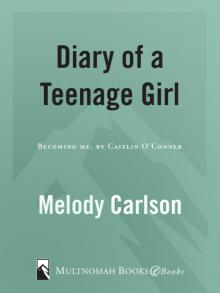 Becoming Me
Becoming Me Finding Alice
Finding Alice Payback
Payback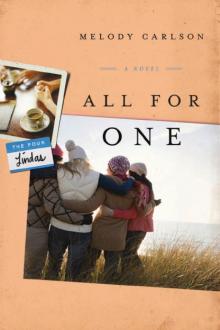 All for One
All for One Under a Summer Sky--A Savannah Romance
Under a Summer Sky--A Savannah Romance Face the Music
Face the Music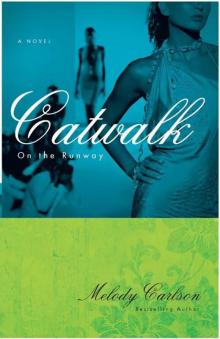 Catwalk
Catwalk Never Been Kissed
Never Been Kissed Allison O'Brian on Her Own
Allison O'Brian on Her Own An Irish Christmas
An Irish Christmas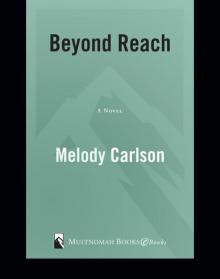 Beyond Reach
Beyond Reach Faded Denim: Color Me Trapped
Faded Denim: Color Me Trapped Three Weddings and a Bar Mitzvah
Three Weddings and a Bar Mitzvah Here's to Friends
Here's to Friends On My Own
On My Own River's Call
River's Call New York Debut
New York Debut Homeward
Homeward Love Finds You in Sisters, Oregon
Love Finds You in Sisters, Oregon Viva Vermont!
Viva Vermont! Notes from a Spinning Planet—Ireland
Notes from a Spinning Planet—Ireland Harsh Pink with Bonus Content
Harsh Pink with Bonus Content Perfect Alibi
Perfect Alibi The Christmas Pony
The Christmas Pony All Summer Long
All Summer Long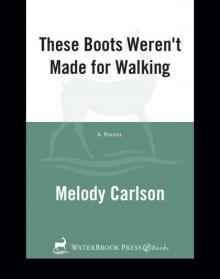 These Boots Weren't Made for Walking
These Boots Weren't Made for Walking Back Home Again
Back Home Again Torch Red: Color Me Torn with Bonus Content
Torch Red: Color Me Torn with Bonus Content Bitter Rose
Bitter Rose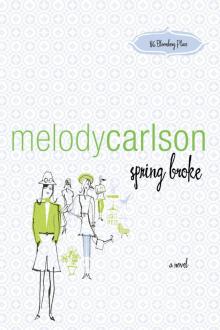 Spring Broke
Spring Broke Sold Out
Sold Out LimeLight
LimeLight Double Date
Double Date Homecoming Queen
Homecoming Queen A Not-So-Simple Life
A Not-So-Simple Life My Name Is Chloe
My Name Is Chloe My Amish Boyfriend
My Amish Boyfriend Once Upon a Summertime
Once Upon a Summertime Let Them Eat Fruitcake
Let Them Eat Fruitcake Deep Green: Color Me Jealous with Bonus Content
Deep Green: Color Me Jealous with Bonus Content The Joy of Christmas
The Joy of Christmas Memories from Acorn Hill
Memories from Acorn Hill Premiere
Premiere A Mile in My Flip-Flops
A Mile in My Flip-Flops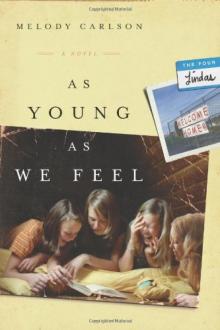 As Young As We Feel
As Young As We Feel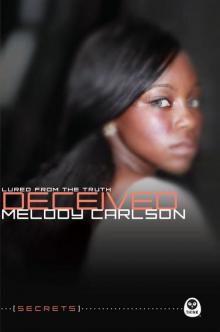 Deceived: Lured from the Truth (Secrets)
Deceived: Lured from the Truth (Secrets) Take Charge
Take Charge Road Trip
Road Trip A Simple Song
A Simple Song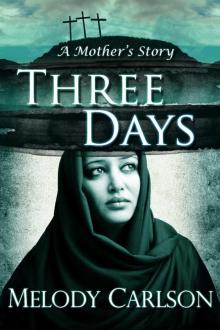 Three Days: A Mother's Story
Three Days: A Mother's Story A Dream for Tomorrow
A Dream for Tomorrow Looking for Cassandra Jane (The Second Chances Novels)
Looking for Cassandra Jane (The Second Chances Novels) Against the Tide
Against the Tide Your Heart's Desire
Your Heart's Desire The Christmas Blessing
The Christmas Blessing Love Gently Falling
Love Gently Falling On This Day
On This Day The Christmas Joy Ride
The Christmas Joy Ride Ciao
Ciao The Christmas Bus
The Christmas Bus Blade Silver: Color Me Scarred
Blade Silver: Color Me Scarred Dating Games #1
Dating Games #1 Double Take
Double Take Falling Up
Falling Up Last Dance
Last Dance Westward Hearts
Westward Hearts Glamour
Glamour Crystal Lies
Crystal Lies The Best Friend
The Best Friend Prom Date
Prom Date The Christmas Angel Project
The Christmas Angel Project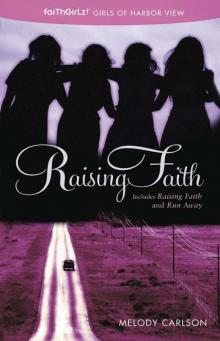 Raising Faith
Raising Faith The 'Naturals: Awakening (Episodes 1-4 -- Season 1) (The 'Naturals: Awakening Season One Boxset)
The 'Naturals: Awakening (Episodes 1-4 -- Season 1) (The 'Naturals: Awakening Season One Boxset) Allison O'Brian on Her Own, Volume 2
Allison O'Brian on Her Own, Volume 2 Notes from a Spinning Planet—Papua New Guinea
Notes from a Spinning Planet—Papua New Guinea Once Upon a Winter's Heart
Once Upon a Winter's Heart Damaged
Damaged Lock, Stock, and Over a Barrel
Lock, Stock, and Over a Barrel Hometown Ties
Hometown Ties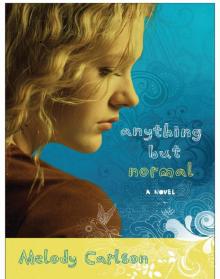 Anything but Normal
Anything but Normal Jerk Magnet, The (Life at Kingston High Book #1)
Jerk Magnet, The (Life at Kingston High Book #1) Damaged: A Violated Trust (Secrets)
Damaged: A Violated Trust (Secrets) Fool's Gold
Fool's Gold Girl Power
Girl Power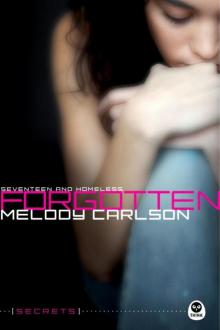 Forgotten: Seventeen and Homeless
Forgotten: Seventeen and Homeless Trading Secrets
Trading Secrets Blood Sisters
Blood Sisters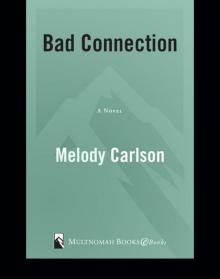 Bad Connection
Bad Connection Spotlight
Spotlight A Simple Christmas Wish
A Simple Christmas Wish Love Finds You in Martha's Vineyard
Love Finds You in Martha's Vineyard Angels in the Snow
Angels in the Snow A Christmas by the Sea
A Christmas by the Sea It's My Life
It's My Life Mixed Bags
Mixed Bags The Christmas Dog
The Christmas Dog Secret Admirer
Secret Admirer Love Finds You in Pendleton, Oregon
Love Finds You in Pendleton, Oregon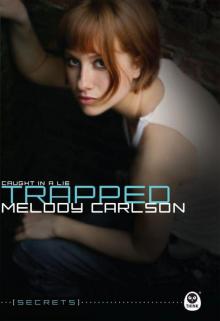 Trapped: Caught in a Lie (Secrets)
Trapped: Caught in a Lie (Secrets) The Gift of Christmas Present
The Gift of Christmas Present Hidden History
Hidden History Meant to Be
Meant to Be The Treasure of Christmas
The Treasure of Christmas Just Another Girl
Just Another Girl River's Song - The Inn at Shining Waters Series
River's Song - The Inn at Shining Waters Series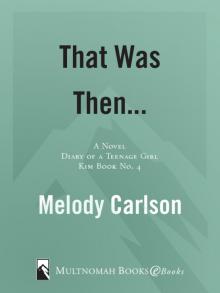 That Was Then...
That Was Then...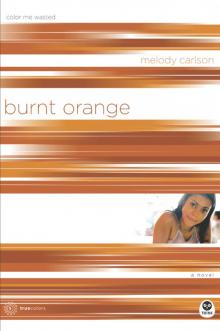 Burnt Orange
Burnt Orange Spring Breakdown
Spring Breakdown The Christmas Cat
The Christmas Cat Christmas at Harrington's
Christmas at Harrington's